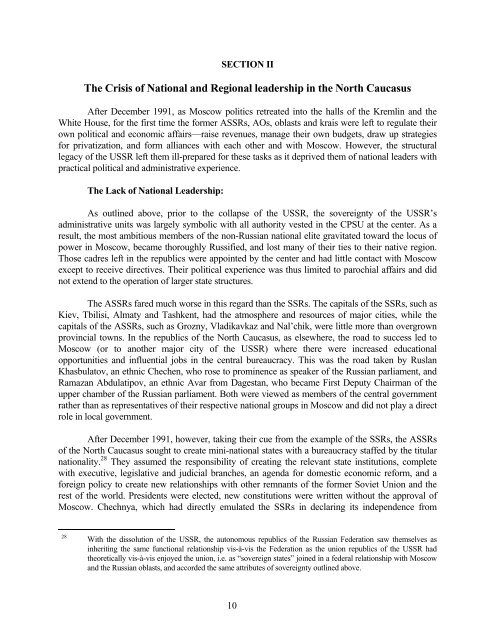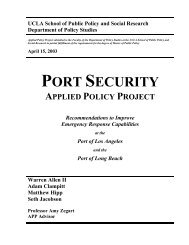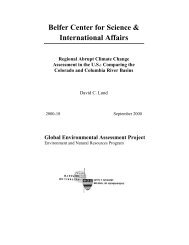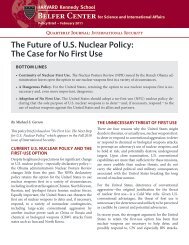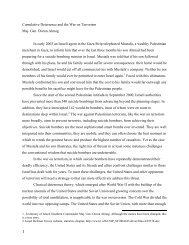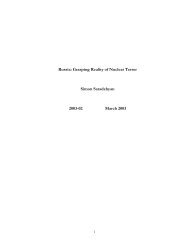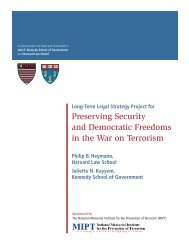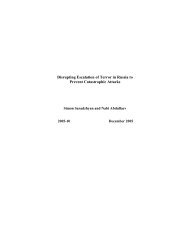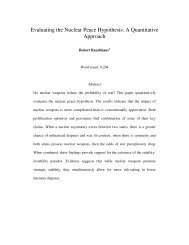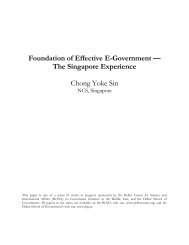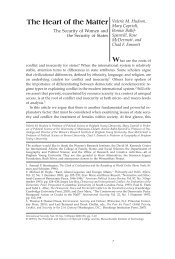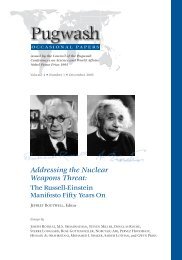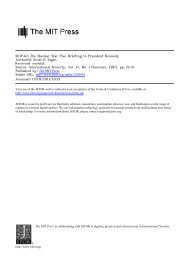RUSSIA'S TINDERBOX - Belfer Center for Science and International ...
RUSSIA'S TINDERBOX - Belfer Center for Science and International ...
RUSSIA'S TINDERBOX - Belfer Center for Science and International ...
You also want an ePaper? Increase the reach of your titles
YUMPU automatically turns print PDFs into web optimized ePapers that Google loves.
SECTION II<br />
The Crisis of National <strong>and</strong> Regional leadership in the North Caucasus<br />
After December 1991, as Moscow politics retreated into the halls of the Kremlin <strong>and</strong> the<br />
White House, <strong>for</strong> the first time the <strong>for</strong>mer ASSRs, AOs, oblasts <strong>and</strong> krais were left to regulate their<br />
own political <strong>and</strong> economic affairs—raise revenues, manage their own budgets, draw up strategies<br />
<strong>for</strong> privatization, <strong>and</strong> <strong>for</strong>m alliances with each other <strong>and</strong> with Moscow. However, the structural<br />
legacy of the USSR left them ill-prepared <strong>for</strong> these tasks as it deprived them of national leaders with<br />
practical political <strong>and</strong> administrative experience.<br />
The Lack of National Leadership:<br />
As outlined above, prior to the collapse of the USSR, the sovereignty of the USSR’s<br />
administrative units was largely symbolic with all authority vested in the CPSU at the center. As a<br />
result, the most ambitious members of the non-Russian national elite gravitated toward the locus of<br />
power in Moscow, became thoroughly Russified, <strong>and</strong> lost many of their ties to their native region.<br />
Those cadres left in the republics were appointed by the center <strong>and</strong> had little contact with Moscow<br />
except to receive directives. Their political experience was thus limited to parochial affairs <strong>and</strong> did<br />
not extend to the operation of larger state structures.<br />
The ASSRs fared much worse in this regard than the SSRs. The capitals of the SSRs, such as<br />
Kiev, Tbilisi, Almaty <strong>and</strong> Tashkent, had the atmosphere <strong>and</strong> resources of major cities, while the<br />
capitals of the ASSRs, such as Grozny, Vladikavkaz <strong>and</strong> Nal’chik, were little more than overgrown<br />
provincial towns. In the republics of the North Caucasus, as elsewhere, the road to success led to<br />
Moscow (or to another major city of the USSR) where there were increased educational<br />
opportunities <strong>and</strong> influential jobs in the central bureaucracy. This was the road taken by Ruslan<br />
Khasbulatov, an ethnic Chechen, who rose to prominence as speaker of the Russian parliament, <strong>and</strong><br />
Ramazan Abdulatipov, an ethnic Avar from Dagestan, who became First Deputy Chairman of the<br />
upper chamber of the Russian parliament. Both were viewed as members of the central government<br />
rather than as representatives of their respective national groups in Moscow <strong>and</strong> did not play a direct<br />
role in local government.<br />
After December 1991, however, taking their cue from the example of the SSRs, the ASSRs<br />
of the North Caucasus sought to create mini-national states with a bureaucracy staffed by the titular<br />
nationality. 28 They assumed the responsibility of creating the relevant state institutions, complete<br />
with executive, legislative <strong>and</strong> judicial branches, an agenda <strong>for</strong> domestic economic re<strong>for</strong>m, <strong>and</strong> a<br />
<strong>for</strong>eign policy to create new relationships with other remnants of the <strong>for</strong>mer Soviet Union <strong>and</strong> the<br />
rest of the world. Presidents were elected, new constitutions were written without the approval of<br />
Moscow. Chechnya, which had directly emulated the SSRs in declaring its independence from<br />
28 With the dissolution of the USSR, the autonomous republics of the Russian Federation saw themselves as<br />
inheriting the same functional relationship vis-à-vis the Federation as the union republics of the USSR had<br />
theoretically vis-à-vis enjoyed the union, i.e. as “sovereign states” joined in a federal relationship with Moscow<br />
<strong>and</strong> the Russian oblasts, <strong>and</strong> accorded the same attributes of sovereignty outlined above.<br />
10


